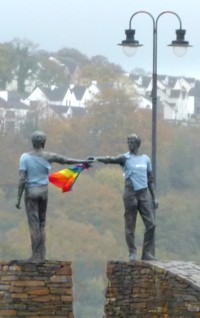The Early Christian and Viking Era
In the first century of the Common Era the Romans considered Ireland's conquest and there is some evidence of a limited Roman presence but, as with Scotland, the potential military and administrative cost exceeded the perceived benefits and this came to naught. Yet within the Roman Empire a new evangelical belief system had sprung up - Judaism for Gentiles - invented in the first century by the author of the revisionist 'Gospel according to St John' and by St Paul who was Saul who wrote most of the rest of the Christian New Testament, save for the Synoptic Gospels and the apocryphal (to the original Church) Revelation of St John the Devine.
At first, Christianity was regarded by the Romans as pernicious, like all things Jewish (as is Falun Gong in China today). The Arch of Titus, built in 82 CE, still stands in Rome celebrating the sacking of Jerusalem and destruction of Herod's Temple at the end of the Jewish-Roman war. But in 313 the Emperor Constantine, whose mother had converted to Christianity, legalised its practice.
Christianity with its 'divine right of kings' and 'one true God' is a religion better suited to the more structured city life of the middle ages than the earlier animistic religions and it's less costly to the State than the polytheistic religions of Greece and Rome. As anyone visiting East Asia quickly observes: in a polytheistic culture the diversion of human and material resources to religious observance can be vast and enormously economically draining. Thus the cost to the Roman State is said to have been an important factor in Constantine creating a new monotheistic State Religion at the Council of Nicaea in 325 CE, where the Christianity we know today was codified, promulgating it as the one and only State supported religion. This change saved Constantine's budget by denying resources to the multitude of polytheistic priesthoods living on the public purse and ultimately spread Christianity across the entire Roman Empire and beyond to become the most practiced religion on the planet.
And so it came to pass that in the fourth century CE Romano-British Christians, like St Patrick, established monasteries and began 'civilising' the Irish through this still very new religion, that brought forward the Zoroastrian 'end of days' to very soon, when Jesus returns. And it was from this periphery, from a monastery near Derry, that Christianity was restored after being almost extinguished in England and most of Europe by the pagan sceptics.
Vikings and world trade
By the eighth century of the Common Era, Norseman (Vikings) who had once lived by raiding in much the same warlike way as the Irish, had become successful navigators and traders across northern Europe, with trade routes reaching as far as Persia and North America. As a consequence they established substantial settlements, generally on estuarine harbours suitable for their longboats, and so too became 'civilised'. Thus by the tenth century: Waterford; Cork; Dublin; Wexford; and Limerick were all substantial fortified towns established, maintained and defended by the Vikings. Among the traded goods and services were slaves, bought and sold in the local markets, some valued for their skills, others for their loyalty or physical strength. See the old Charlestown Slave Market in our recent US trip.
Over the years, these towns grew in size so that the inhabitants were no longer just Norsemen and their slaves but the decedents of local people who had provided food materials and services to the towns. As in all towns generalists became specialists and followed a trade. Initially the Irish kings were concerned that the Vikings were pagans but in due course the Vikings (as they did in Russia) adopted Christianity.

